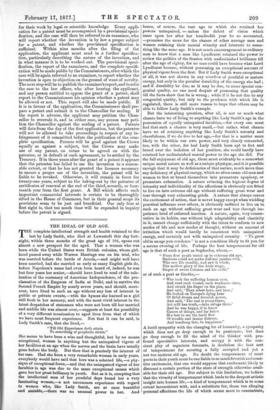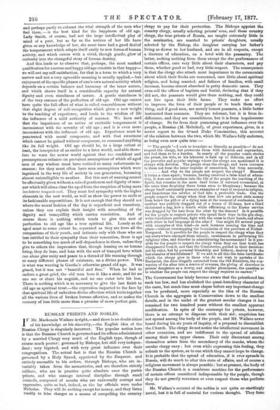THE IDEAL OF OLD AGE.
THE complete intellectual strength and health retained to the last by Lady Smith, who died at Lowestoft this day fort- night, within three months of the great age of 104, opens out almost a new prospect for the aged. That a woman who was born while the United States were British colonies, whose girl- hood passed away while Warren Hastings was on his trial, who was married before the battle of Arcola,—and might well have been married, had she married as early as many English girls do, before Napoleon's name had even been heard of, indeed, he was but four years her senior,—should have lived to read of the cele- bration of the centenary of American Independence, of the pro- clamation of the Empress of India at Delhi, and to survive the Second French Empire by nearly seven years, and should, more- over, have lived to such an age without any loss of interest in public or private events,—with the hymns she learned as a girl still fresh in her memory, and with the most vivid interest in the latest despatches of statesmen who were not born till her married and middle life was almost over,—suggests at least the possibility of a very different termination to aged lives from that of which we have most frequent experience. Not that it can be said, in Lady Smith's case, that she lived,— " Till Old Experience doth attain To something of prophetic strain."
She seems to have been a wise and thoughtful, but by no means exceptional, woman in anything but the unimpaired vigour of her facades at an age when the nerves and the brain have usually gone before the body. But then that is precisely the interest of her case. Had she been a very remarkable woman in early years, everybody would have said that hers was a selected life,—a phy- sique of exceptional force,—and that the unimpaired vigour of her faculties in age was due to the same exceptional causes which gave her her great brilliancy in youth. But as it is, excepting that the intellectual men of her youthful days found her a very fascinating woman,—a not uncommon experience with regard to women who, like Lady Smith, are at once beautiful and amiable,—there was no unusual power in her. And
hence, of course, the vast age to which she retained her powers unimpaired, — unless the defect of vision which came upon her after her hundredth year be so accounted, —promises the more for the chance of other average men and women retaining their mental vivacity and interests to some- thing like the same age. It is not much encouragement to ordinary men to know that a man like Lyndhurst retained the power to review the politics of the Session with undiminished brilliance till after the age of eighty, for no man could have become what Lord Lyndhurst became, without possessing an exceptional amount of physical vigour from the first. But if Lady Smith were exceptional at all, it was not shown in any overflow of youthful or mature energy, but only in the peculiar durability of the energy she had ; and if durability be due, as it may be due, to some special con- genital quality, no one need despair of possessing that quality till the facts show that he is wrong ; while if it be not due to any congenital quality, but only to the prudence with which life is regulated, there is still more reason to hope that others may be able to follow Lady Smith's example.
But the interesting question, after all, is not so much what chance have we of living to anything like Lady Smith's age in the possession of equally unimpaired faculties,—for every one must feel that such a chance is very small,—but rather, what chance have we of retaining anything like Lady Smith's serenity and cheerfulness, if we do live to her age,—for that is a matter more likely to be within our own power, and very closely connected, too, with the other, for had Lady Smith been apt to fret and brood over the isolation of her position, she could hardly have retained her undiminished mental power to the age she did. For the full enjoyment of old age, there must evidently be a somewhat unique moral nature as well as a unique physique, audit is possible enough that it may be deficiencies of that nature, much more than any deficiency of physical energy, which so often cause old men and women to fret or brood themselves into premature apoplexy, or premature exhaustion. A nature evincing the highest degree of intensity and individuality of the affections is obviously not fitted to live on into extreme old age without suffering great wear and tear through very exhausting griefs. A nature that always craves the excitement of action, that is never happy except when wielding practical influence over others, is obviously unfitted to live on to such an age without suffering great wear and tear through im- patience bred of enforced inaction. A nature, again, very conser- vative in its habits, one without high adaptability and elasticity in it, cannot change sufficiently with the times to conform to new modes of life and new modes of thought, without an amount of irritation which would hardly be consistent with unimpaired energy, and certainly not with unimpaired serenity. "To grow old in an age you condemn" is not a condition likely to fit you for a serene evening of life. Perhaps the best temperament for old age is that of such a poet as Sophocles, whom,—
" From first youth tested up to extreme old ago, Business could not make dull nor passion wild, Who saw life steadily, and saw it whole, The mellow glory of the Attic stage, Singer of sweet Colonus and his child."
or of such a poet as Goethe,—
6‘ Who took the suffering human race,
And read each wound, each weakness clear, And struck his finger on the place, And said, 'Thou ailest here, and here ;' He looked on Europe's dying hour Of fitful dream and feverish power, And said, 'The end is everywhere, Art still has truth,—take refuge there.'
And he was happy, if to know Causes of things, and far below His feet to see the lurid flow Of trouble and insane distress, And headlong fate, be happiness."
A lucid sympathy with the changing lot of humanity, a sympathy which does not go deep enough to be passionate, but does go deep enough to fill the mind of the thinker with pro- found speculative interests, and occupy it with the con- stant play of sagacious forecasts, is doubtless the best sort of temperament for seeming a fully occupied and yet a not too anxious old age. No doubt the temperament of most poets in their youth must be one liable to so much feverish and sensi- tive excitement, that one would suppose that excitement likely to discount a certain portion of the store of strength otherwise avail- able for their old age. But subject to this limitation, we believe that the vivacity of temperament which leads to the deepest artistic insight into human life,—a kind of temperament which is to some extent inconsistent with, and a substitute for, those too clinging personal affections the life of which seems most to concentrate, and perhaps partly to exhaust the vital strength of the men who feel them, —is the best kind for the happiness of old age. Lady Smith, of course, had not the large intellectual play of mind of a poet, but as far as the notices of her life have given us any knowledge of her, she must have had a good deal of the temperament which adapts itself easily to new forms of human activity, and which enters with a vivid, though gentle, glow of curiosity into the changeful story of human destiny.
And this leads us to observe that, perhaps, the most marked qualification for a serene and happy old age consists in that happy— we will not say self-satisfaction, for that is a term to which a very narrow and not a very agreeable meaning is usually applied,—but enjoyment of the specific phases of one's own natural activity which depends on a certain balance and harmony of the inner nature, and which shows itself in a considerable capacity for natural dignity and even stateliness of nature. A gentle stateliness is of the very essence of the perfection of old age. Old age cannot have quite the full effect of what is called venerableness without that slight degree of self-recognition which gives a new weight to the teaching of experience, and lends to the wisdom of life the influence of a mild authority of manner. We have said
at the impatience of an active or excitable temperament is inconsistent with the serenity of old age ; and it is even more inconsistent with the influence of old age. Experience must be penetrated with moral composure, and with that sweetness which cannot be gained without composure, to command anything like its full weight. Old age should be, to a large extent at least, the interpreter of an earlier to a later world, and able there- fore to warn the newer world against that too confident and presumptuous reliance on prevalent assumptions of which all aged men of any wisdom must have noticed so many unfortunate in- stances; for they must often have seen assumptions which were ingrained in the very life of society in one generation, becoming almost unintelligible to another. But this sort of warning cannot be effectually given without a mixed gentleness and dignity of man- ner -which will alone clear the aged from the suspicion of being mere laudatores temporis acti. They must feel sympathy with the higher elements in the new world, as well as show the power to smile at its fashionable superstitions. It is not enough that they should see where the moral fashion of the day is superficial and transitory, unless they can explain their insight with something of the dignity and tranquillity which carries conviction. And of Course there is nothing which tends to give this sort of perfection to old age like a true spiritual life. Lonely as the aged must to some extent be, separated as they are from all the companions of their youth, and intimate only with those who are less entitled to their sympathy than their veneration, there is apt to be something too much of self-dependence in them, unless they give to others the impression that, though leaning on no human being, they do lean, and lean with the sort of tranquil love which can alone give unity and peace to a thread of life running through so many different phases of existence, on a divine power. This is what was wanting in Goethe's otherwise grand old age. It was grand, but it was not "beautiful and free." When he had to endure a great grief, the old man bore it like a stoic, and let no one see or share his anguish, and no one enter into his loss. There is nothing which is so necessary to give the last finish to old age as spiritual trust,—the expression imparted to the face by that spiritual life of unbroken divine affection which knits together all the various lives of broken human affection, and so makes the memory of loss little more than a promise of more perfect gain.



































 Previous page
Previous page